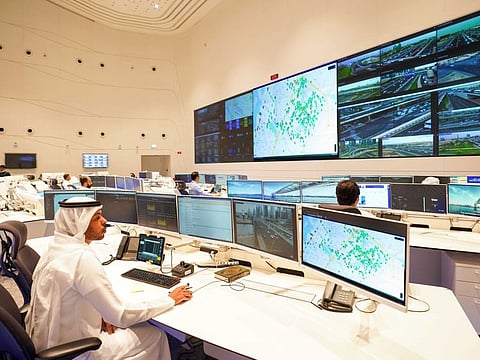Global traffic flow: Dubai tops in terms of time taken to cover 10km in Central Business District
Emirate ranked among world’s 50 best cities in TomTom Traffic Flow Index

Dubai: Dubai has secured exceptional rankings in the Traffic Flow Index, as per the 2022 Traffic Index Report by TomTom, a multinational specialising in monitoring congestion and traffic worldwide. A total of 390 cities across 56 countries were analysedcovering over 543 billion kilometres of road networks. TomTom is a partner of RoadSafetyUAE in corporate social responsibility (CSR).
According to the report, Dubai outperformed major global cities including Los Angeles, Montreal, Sydney, Berlin, Rome and Milan in terms of the average time needed to travel a distance of 10km in the Central Business District (CBD). In Dubai, the journey time was recorded at 12 minutes per 10km, compared to the average of 21 minutes per 10km in the referenced cities. In contrast, the best-performing city on this index was Almere in the Netherlands, with eight minutes per 10km, while the lowest-performing city was London, with 36 minutes per 10km.
In the same index, Dubai ranked supremely among cities, recording a time of nine minutes per 10km in the urban area, with an average speed of 59km/h. This compares to the top-performing city, Greensboro in the US, with seven minutes and 40 seconds per 10km and an average speed of 74km/h. Meanwhile, the lowest-performing city was Bogota in Colombia, with 24 minutes per 10km and an average speed of 19km/h.
Mattar Al Tayer, Director-General, Chairman of the Board of Executive Directors of the Roads and Transport Authority (RTA), expressed his deep gratitude for the distinguished results achieved by Dubai in the traffic index. “These accomplishments stem from the wise leadership of His Highness Sheikh Mohammed bin Rashid Al Maktoum, Vice-President, Prime Minister of the UAE, Ruler of Dubai, and the follow-up of Sheikh Hamdan bin Mohammed bin Rashid Al Maktoum, Crown Prince of Dubai, Chairman of the Executive Council, and Sheikh Maktoum bin Mohammed bin Rashid Al Maktoum, First Deputy Ruler of Dubai, Deputy Prime Minister, Minister of Finance, to elevate the infrastructure of Dubai’s road and transportation network, under the ultimate goal of making Dubai the best city for living on earth.”
Mega projects
“Under the directives of the wise leadership, RTA has, since establishment, completed a multitude of enormous infrastructure projects. Such projects are highlighted by Dubai Metro, which now spans 90 m after the launch of Route 2020, the 11-km Dubai Tram. RTA had also carried out many road projects that contributed to expanding the total length of the road network from 8,715 lane-kilometre in 2006 to 18,475 lane-kilometre in 2022. The number of bridges and underpasses climbed up eight folds from 129 bridges and underpasses in 2006 to 884, and the number of pedestrian bridges and underpasses has also soared 5 folds from 26 pedestrian bridges and underpasses to 122 during the same period, including Dubai Metro and Tram bridges. The length of the cycling tracks increased from 9km in 2006 to 543km in 2022,” said Al Tayer.
“RTA’s efforts and plans were not limited to developing the infrastructure but also focused on developing public transport networks and implementing transport policies aimed at reducing dependence on private vehicles. It also focused on developing applications and technical systems to achieve optimal utilisation of transport networks and facilities and traffic management, namely the Traffic Control Centre and the Enterprise Command and Control Centre (EC3). The projects undertaken by RTA had enhanced the UAE’s global competitiveness and ranked it first in the quality of roads worldwide for 5 years in a row. It also led to the strengthening of Dubai’s global position in terms of traffic and congestion levels.
RTA’s efforts had contributed to the development of the roads and public transport network, which brings great benefits to the economy and society, as the total cumulative value of time and fuel savings as a result of these projects amounted to over Dh262 billion between 2006 and 2022. In the field of traffic safety, the concentrated efforts of RTA and the Dubai Police improved road incident-related fatalities from 22 cases per 100,000 of the population in 2006 to 1.9 cases in 2022,” added Al Tayer.
“RTA’s fully integrated public transport network has now become the backbone of people’s movement around Dubai, with the ridership of public transport, shared mobility and taxis increasing from 163 million passengers in 2006 to 621.4 million passengers in 2022, with a daily average rate of 1.7 million passengers. The public transport network had contributed to reducing dependence on private vehicles and reducing traffic congestion. The network was successful in persuading a change in the culture and mindsets of the community towards adopting public transportation and become the first choice of mobility for a large segment of the community and visitors,” concluded Al Tayer.
Sign up for the Daily Briefing
Get the latest news and updates straight to your inbox



